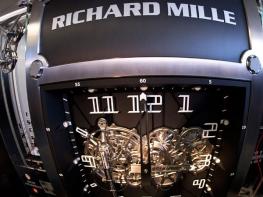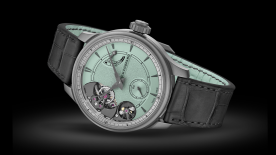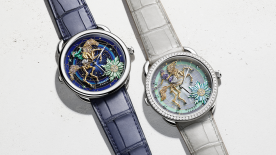Christened “l’Horloge Porte-bonheurE”, the project was launched in 2008 to celebrate the 400th anniversary of Quebec City. The Republic and Canton of Jura and Richard Mille wanted to give Quebec a symbolic gift and this exclusive creation is emblematic of the region, representing the culture, know-how and activity of the Canton of Jura. The clock is designed to embody the values and exacting standards of the Jura Maison: incomparably modern design, unprecedented architectural construction and a unique level of technical skills.
It took six years for the Richard Mille engineers, working in partnership with the technical college of Porrentruy and the Neuchâtel Haute Ecole Arc, to design, manufacture, and assemble this monumental clock.
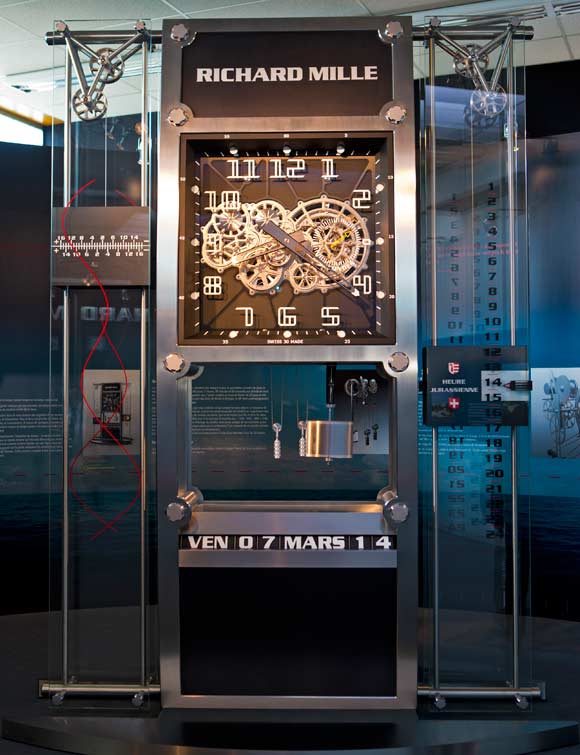
It is the first clock designed and made to the exacting standards and conventions of très Haute Horlogerie and required 6,571 hours of development, 5,451 components and 3,952 hours of assembly and adjustment. The stainless steel case recalls the dynamic, curved design of RM watch cases. It is assembled with 16 spline screws and measures 350 x 250 x 130 cm, weighing in at 1,913 kg.
This unique timepiece has two faces showing two different displays: on one side you can see the hours and minutes, while the other face displays seconds, minutes, hours and a perpetual calendar. The movement encapsulates all the inspiration and imagination that the brand injects into its designs. The impressive dial and hands skim over the plate and the ribbed bridges, which recall the central bridges of an RM 003. The other bridges are reminiscent of the RM 055, and the baseplate itself recalls the RM 005. In all, the clock comprises 3,600 parts made of brass, stainless steel, titanium, aluminium, ceramic and ruby. The calibre, gear-trains and balance wheel can be seen through the anti-reflective treated mineral glass all around the movement.
The designers of this movement have made use of horological grandes complications to ensure optimum chronometry, such as the constant-force device, a rare mechanism of extraordinary complexity that compensates for the different negative influences arising from the weight of the hands, and the tiny variations in force due to the many toothed wheels. This cam mechanism releases and blocks the force of the daily weight transmitted by two big wheels.
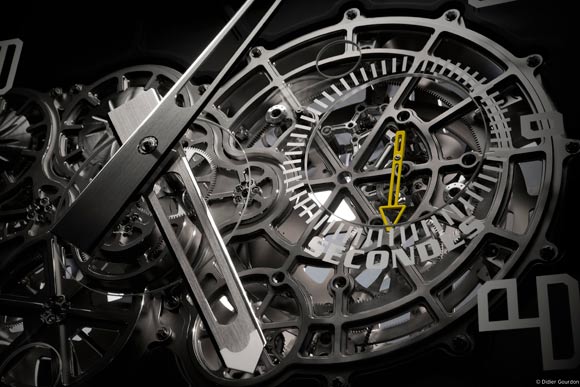
At the same time, an equation of the time mechanism operates through the intermediary of a driving-weight which descends once a year. During its slow course, this weight operates as a mobile slide-contact along a sinuous red line etched into the glass. In combination with the scale engraved onto the weight, this line indicates the variations in minutes between real time and average time during the course of the year.
A second time zone – that of the Jura in Switzerland – is displayed all along the glass column, made visible by the ascending movement of a specific window.
As with all Richard Mille watches, the entire movement and case are hand-finished to ensure this piece of Haute Horlogerie is a work of perfection. The fine quality of satin-finishing, micro-bead blasting, polishing and surface treatments are a glowing tribute to the craftsmanship of Richard Mille watchmakers and decorators as well as the students of the Porrentruy technical college and Haute Ecole Arc.
The Richard Mille clock is on display at Porrentruy from 7 March to 3 May 2014 and will then be installed in the Jardins de l’Hôtel de Ville in Quebec, where it will stand permanently as a symbol of the strong friendship between Quebec and the Republic and Canton of Jura.

